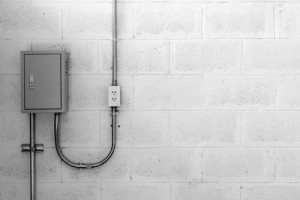
That gray or white electrical panel in your house may not seem like much, but it’s actually one of the most crucial aspects of your home — responsible for delivering convenience and comfort in the form of electricity. This device brings electricity into your residence, and routes it towards the areas that need it most, yet it’s also sensitive to upgrades in technology, and has the capacity to become quickly outdated, and overwhelmed.
The modern appliances that we now use might be more “energy efficient” than some of their older generations, but most homeowners still use significantly more energy than they did in the past. In fact, the average American in 1950 consumed around 2,200 kilowatt-hours (kwh) of electricity, compared to around 14,000 kwh today. This means that your older home might not support all of your modern electrical needs.
Following, we’ll address just some of the most common signs that indicate you may need an electrical panel upgrade.
1. You Live in an Older Property
A lot of homeowners today appreciate older properties – not only are they practical, but they offer a cozy “retro” atmosphere that many people appreciate. However, even if you love your old-fashioned home, it may be time to embrace the future with your electricity panel.
Once upon a time, we could get all of the energy we needed from a single 60-amp electrical panel. However, today, 60 amps won’t get the job done, meaning you need to upgrade to a 100-amp, or 200-amp version in order to use all of the electrical equipment and outlets you access on a daily basis. If you’re unsure how old your existing electrical panel is, here are a few signs that it’s not young enough to keep up with the modern workload:
- Your appliances aren’t performing at their best
- Your lights flicker
- You have a defective panel that doesn’t shut off during overload
- Using multiple appliances trips breakers
- The panel looks melted, or corroded
2. You’re Constantly Using Extension Cords
Extension cords are a common part of most homes, but they’re not always as safe and convenient as you might think. In fact, extension cords are usually designed for brief use, perhaps during short-term holidays or events.
Besides creating a serious tripping hazard, electrical wires are usually kept in or against walls for a purpose, a protected system of wiring leads to less wear and tear. Those wires left strewn across your living room floor can get shorted, kinked, or pinched, leading to damaged outlets, tripped breakers, or even fire. If you’re constantly turning to your extension cords, then it’s time to upgrade your electrical panel and install a few more outlets.
3. You Have Fuses, not Circuit Breakers
If your home was built sometime before the 1970s, then it may have a fuse-based electrical system in place. While both fuses and circuit breakers perform the same function, it’s worth noting that fuses are outdated, and unlike circuit breakers, they don’t trip when they’re overloaded, and melt, blow, or short-circuit instead.
Electricians used fuse-based systems when the average home didn’t absorb such a significant amount of electricity, and overwhelming these devices today can be costly, inconvenient, and even dangerous in rare cases. Because of the small risk of fire, some insurance companies even prefer not to cover homes that still use fuses.
4. Your Breakers Are Frequently Tripping
If you are using circuit breakers, rather than fuses, you should know that they’re designed to trip when detecting inconsistencies in the flow of electricity, preventing the system from overheating and causing a fire hazard. While tripping is an important safety feature, if you’re constantly visiting the breaker box, that’s a sure sign that something is wrong with your electrical panel.
Frequent circuit tripping often indicates that the electrical draw in your home is too much for your electrical panel, which means that it’s time to upgrade.
5. You’re Upgrading your Home, or Appliances
Finally, if you’re expanding your home, remodeling, or introducing new and exciting electrical products into your property, then this could be a sign that you need to upgrade your electrical panel. After all, you need to make sure that you have the power necessary for your enhanced home to function properly.
Anything from a new room, to the addition of a new major appliance such as a refrigerator, hot tub, or air conditioner (not just a new toaster), could overburden your existing electrical panel, damaging performance throughout your home.
It’s Not Just about Convenience
Remember, as important as it may be to upgrade your electrical panel to make sure that you’re getting the power you need for your modern appliances, it’s also crucial to upgrade for the sake of safety. After all, home electrical problems cause almost 51,000 fires each year, which contribute to around $1.3 billion in property damage.
Upgrading your electrical panel isn’t just a good idea — sometimes it’s essential.

 FREE Live Music and Family Fun at Allied Gardens First Fridays The next Allied Gardens First Fridays Summer Concert in the Park is just around the corner. Grab your lawn chairs, bring a picnic, and get ready to meet your
FREE Live Music and Family Fun at Allied Gardens First Fridays The next Allied Gardens First Fridays Summer Concert in the Park is just around the corner. Grab your lawn chairs, bring a picnic, and get ready to meet your  Ideal Plumbing Heating Air Electrical Named Winner of 2023 Better Business Bureau Torch Awards for Ethics in San Diego (San Diego, CA – September 15, 2023) Better Business Bureau Serving the Pacific Southwest (BBB) has named Ideal Plumbing Heating
Ideal Plumbing Heating Air Electrical Named Winner of 2023 Better Business Bureau Torch Awards for Ethics in San Diego (San Diego, CA – September 15, 2023) Better Business Bureau Serving the Pacific Southwest (BBB) has named Ideal Plumbing Heating